Pentium® II/Celeron™ Motherboard
® P2V
USER’S MANUAL
�
USER'S NOTICE
No part of this manual, including the products and software described in it, may be repro-
duced, transmitted, transcribed, stored in a retrieval system, or translated into any language
in any form or by any means, except documentation kept by the purchaser for backup pur-
poses, without the express written permission of ASUSTeK COMPUTER INC. (“ASUS”).
ASUS PROVIDES THIS MANUAL “AS IS” WITHOUT WARRANTY OF ANY KIND,
EITHER EXPRESS OR IMPLIED, INCLUDING BUT NOT LIMITED TO THE IMPLIED
WARRANTIES OR CONDITIONS OF MERCHANTABILITY OR FITNESS FOR A PAR-
TICULAR PURPOSE. IN NO EVENT SHALL ASUS, ITS DIRECTORS, OFFICERS,
EMPLOYEES OR AGENTS BE LIABLE FOR ANY INDIRECT, SPECIAL, INCIDEN-
TAL, OR CONSEQUENTIAL DAMAGES (INCLUDING DAMAGES FOR LOSS OF
PROFITS, LOSS OF BUSINESS, LOSS OF USE OR DATA, INTERRUPTION OF BUSI-
NESS AND THE LIKE), EVEN IF ASUS HAS BEEN ADVISED OF THE POSSIBILITY
OF SUCH DAMAGES ARISING FROM ANY DEFECT OR ERROR IN THIS MANUAL
OR PRODUCT.
Product warranty or service will not be extended if: (1) the product is repaired, modified or
altered, unless such repair, modification of alteration is authorized in writing by ASUS; or
(2) the serial number of the product is defaced or missing.
Products and corporate names appearing in this manual may or may not be registered trade-
marks or copyrights of their respective companies, and are used only for identification or
explanation and to the owners’ benefit, without intent to infringe.
• Intel, LANDesk, Pentium, and Celeron are trademarks of Intel Corporation.
• IBM and OS/2 are registered trademarks of International Business Machines.
• Symbios is a registered trademark of Symbios Logic Corporation.
• Windows and MS-DOS are registered trademarks of Microsoft Corporation.
• Sound Blaster AWE32 and SB16 are trademarks of Creative Technology Ltd.
• Adobe and Acrobat are registered trademarks of Adobe Systems Incorporated.
The product name and revision number are both printed on the product itself. Manual revi-
sions are released for each product design represented by the digit before and after the period
of the manual revision number. Manual updates are represented by the third digit in the
manual revision number.
For previous or updated manuals, BIOS, drivers, or product release information, contact ASUS
at http://www.asus.com.tw or through any of the means indicated on the following page.
SPECIFICATIONS AND INFORMATION CONTAINED IN THIS MANUAL ARE FUR-
NISHED FOR INFORMATIONAL USE ONLY, AND ARE SUBJECT TO CHANGE AT
ANY TIME WITHOUT NOTICE, AND SHOULD NOT BE CONSTRUED AS A COM-
MITMENT BY ASUS. ASUS ASSUMES NO RESPONSIBILITY OR LIABILITY FOR
ANY ERRORS OR INACCURACIES THAT MAY APPEAR IN THIS MANUAL, INCLUD-
ING THE PRODUCTS AND SOFTWARE DESCRIBED IN IT.
Copyright © 1999 ASUSTeK COMPUTER INC. All Rights Reserved.
ASUS P2V
Product Name:
Manual Revision: 1.01 E384
May 1999
Release Date:
2
ASUS P2V User’s Manual
�
ASUS CONTACT INFORMATION
ASUSTeK COMPUTER INC. (Asia-Pacific)
Marketing
Address:
Telephone:
Fax:
Email:
150 Li-Te Road, Peitou, Taipei, Taiwan 112
+886-2-2894-3447
+886-2-2894-3449
info@asus.com.tw
Technical Support
Tel (English): +886-2-2894-3447 ext. 706
Tel (Chinese): +886-2-2894-3447 ext. 111
Fax:
Email:
Newsgroup:
WWW:
FTP:
+886-2-2895-9254
tsd@asus.com.tw
news2.asus.com.tw
www.asus.com.tw
ftp.asus.com.tw/pub/ASUS
ASUS COMPUTER INTERNATIONAL (America)
Marketing
Address:
6737 Mowry Avenue, Mowry Business Center, Building 2
Newark, CA 94560, USA
+1-510-608-4555
info-usa@asus.com.tw
Fax:
Email:
Technical Support
Fax:
BBS:
Email:
WWW:
FTP:
+1-510-608-4555
+1-510-739-3774
tsd-usa@asus.com.tw
www.asus.com
ftp.asus.com.tw/pub/ASUS
ASUS COMPUTER GmbH (Europe)
Marketing
Address:
Telephone:
Fax:
Email:
Harkort Str. 25, 40880 Ratingen, BRD, Germany
49-2102-445011
49-2102-442066
sales@asuscom.de
Technical Support
Hotline:
BBS:
Email:
WWW:
FTP:
49-2102-499712
49-2102-448690
tsd@asuscom.de
www.asuscom.de
ftp.asuscom.de/pub/ASUSCOM
ASUS P2V User’s Manual
3
�
CONTENTS
I. INTRODUCTION
II. FEATURES
III. INSTALLATION
7
How this Manual is Organized ........................................................... 7
Item Checklist ..................................................................................... 7
8
Features of the ASUS P2V Motherboard ............................................ 8
The ASUS P2V Motherboard ........................................................ 9
10
Layout of the ASUS P2V Motherboard ............................................ 10
Installation Steps ............................................................................... 12
1. Jumpers ......................................................................................... 12
Jumper Settings ........................................................................... 13
2. System Memory (DIMM) ............................................................. 17
DIMM Memory Installation Procedures: .............................. 18
3. Central Processing Unit (CPU) .................................................... 19
Universal Retention Mechanism ........................................... 19
Heatsinks ............................................................................... 19
Installing the Processor ............................................................... 20
ASUS Smart Thermal Solutions ............................................ 22
Recommended Heatsinks for Slot 1 Processors .................... 23
4. Expansion Cards ........................................................................... 24
Expansion Card Installation Procedure ................................. 24
Assigning IRQs for Expansion Cards.................................... 24
Assigning DMA Channels for ISA Cards .............................. 25
ISA Cards and Hardware Monitor ......................................... 25
5. External Connectors ..................................................................... 26
Power Connection Procedures .......................................................... 33
34
Flash Memory Writer Utility ............................................................ 34
Main Menu .................................................................................. 34
Managing and Updating Your Motherboard’s BIOS ................... 36
6. BIOS Setup .................................................................................. 37
Load Defaults ........................................................................ 38
Standard CMOS Setup ................................................................ 38
Details of Standard CMOS Setup: ......................................... 38
BIOS Features Setup ................................................................... 41
Details of BIOS Features Setup ............................................. 41
IV. BIOS SOFTWARE
4
ASUS P2V User’s Manual
�
CONTENTS
Chipset Features Setup ................................................................ 44
Details of Chipset Features Setup .......................................... 44
Power Management Setup ........................................................... 47
Details of Power Management Setup .................................... 47
PNP and PCI Setup ..................................................................... 50
Details of PNP and PCI Setup ............................................... 50
Load BIOS Defaults .................................................................... 52
Load Setup Defaults .................................................................... 52
Supervisor Password and User Password ................................... 53
IDE HDD Auto Detection ........................................................... 54
Save & Exit Setup ....................................................................... 55
Exit Without Saving .................................................................... 55
56
Desktop Management Interface (DMI)............................................. 56
Introducing the ASUS DMI Configuration Utility ................ 56
System Requirements ............................................................ 56
Using the ASUS DMI Configuration Utility ......................... 57
Using the ASUS DMI Configuration Utility ......................... 57
59
ASUS PCI-L101 Fast Ethernet Card ................................................ 59
Features ............................................................................................. 60
Software Driver Support ............................................................. 60
Question and Answer .................................................................. 60
V. DESKTOP MANAGEMENT
VI. ASUS LAN Card
ASUS P2V User’s Manual
5
�
FCC & DOC COMPLIANCE
Federal Communications Commission Statement
This device complies with FCC Rules Part 15. Operation is subject to the following
two conditions:
• This device may not cause harmful interference, and
• This device must accept any interference received, including interference that
may cause undesired operation.
This equipment has been tested and found to comply with the limits for a Class B
digital device, pursuant to Part 15 of the FCC Rules. These limits are designed to
provide reasonable protection against harmful interference in a residential installa-
tion. This equipment generates, uses and can radiate radio frequency energy and, if
not installed and used in accordance with manufacturer's instructions, may cause
harmful interference to radio communications. However, there is no guarantee that
interference will not occur in a particular installation. If this equipment does cause
harmful interference to radio or television reception, which can be determined by
turning the equipment off and on, the user is encouraged to try to correct the inter-
ference by one or more of the following measures:
• Re-orient or relocate the receiving antenna.
•
• Connect the equipment to an outlet on a circuit different from that to which
Increase the separation between the equipment and receiver.
the receiver is connected.
• Consult the dealer or an experienced radio/TV technician for help.
WARNING! Any changes or modifications to this product not expressly ap-
proved by the manufacturer could void any assurances of safety or performance
and could result in violation of Part 15 of the FCC Rules.
Canadian Department of Communications Statement
This digital apparatus does not exceed the Class B limits for radio noise emissions
from digital apparatus set out in the Radio Interference Regulations of the Cana-
dian Department of Communications.
This Class B digital apparatus complies with Canadian ICES-003.
Cet appareil numérique de la classe B est conforme à la norme NMB-003 du Canada.
6
ASUS P2V User’s Manual
�
t
s
i
l
I
N
O
T
C
U
D
O
R
T
N
I
.
I
k
c
e
h
C
/
l
a
u
n
a
M
I. INTRODUCTION
How this Manual is Organized
This manual is divided into the following sections:
Introduction:
Features:
Installation:
I.
II.
III.
IV. BIOS Software:
V.
Manual information and checklist
Information and specifications concerning this product
Instructions on setting up the motherboard
Instructions on setting up the BIOS software
Support Software: Information on the included support software
Item Checklist
Please check that your package is complete. If you discover damaged or missing
items, please contact your retailer.
(1) ASUS Motherboard
(1) Universal Retention Mechanism for SECC/SECC2/SEPP
(1) IDE ribbon cable for master and slave drives
(1) Floppy ribbon cable for (1) 5.25inch floppy and (2) 3.5inch floppies
(1) Bag of spare jumper caps
(1) Support CD with drivers and utilities
(1) User’s manual
S-P2FAN or P2T-Cable for Slot 1 processors (optional)
IrDA-compliant infrared module (optional)
ASUS PCI-L101 Wake-on-LAN 10/100 Ethernet Card (optional)
ASUS P2V User’s Manual
7
�
II. FEATURES
Features of the ASUS P2V Motherboard
The ASUS P2V is carefully designed for the demanding PC user who wants ad-
vanced features processed by the fastest CPU.
• Multi-Speed: Supports Intel Pentium® II (233 to 500MHz) and CeleronTM (266MHz and
faster) processors.
• Multi-Cache: Supports processors with or without Pipelined Burst Level 2 cache.
• VIA Chipset: Features VIA’s VT82C693 chipset with I/O subsystems and front-side bus
S
p
e
c
i
f
i
c
a
t
i
o
n
s
I
I
.
F
E
A
T
U
R
E
S
•
•
•
(FSB) platform, which boosts the traditional 66-MHz internal bus speed to 100MHz.
Enhanced ACPI and Anti-Boot Virus BIOS: Features a programmable BIOS, offering en-
hanced ACPI for Windows 98 compatibility, built-in hardware-based virus protection through
Trend ChipAway Virus, and autodetection of most devices for virtually automatic setup.
PC100 Memory Support: Equipped with three DIMM sockets to support Intel PC100-
compliant SDRAMs (8, 16, 32, 64, 128 or 256MB) up to 768MB. These new SDRAMs are
necessary to meet the enhanced 100MHz bus speed requirement.
Thermal Sensor Connector with Optional Sensor: Accurately detects the CPU tem-
perature of processors with the ASUS Smart Fan or the Intel boxed processor heatsink
with fan when connected to an ASUS P2T-Cable.
• Hardware Monitoring: Provides a convenient utility to monitor your system’s vital
components/activities, such as fan rotations, voltages, and temperatures.
• Wake-On-LAN: Supports Wake-On–LAN activity with special network cards, such as
the ASUS PCI-L101 10/100 Fast Ethernet PCI card.
• AGP Slot: Supports Accelerated Graphics Port cards for high performance, component
•
•
•
•
level interconnect targeted at 3D graphical display applications.
SMBus: Features the System Management Bus interface, which is used to physically
transport commands and information between SMBus devices.
PCI & ISA Expansion Slots: Provides four 32-bit PCI and three 16-bit ISA slots.
Intelligence: Supports Keyboard Power Up, Fan Status Monitoring and Alarm, Tem-
perature Monitoring and Alert, Voltage Monitoring and Alert, System Resources Alert,
Intel LANDesk Client Manager (LDCM), and ASUS PC Probe software.
Super Multi-I/O: Provides two high-speed UART compatible serial ports and one parallel
port with EPP and ECP capabilities. UART2 can also be directed from COM2 to the Infra-
red Module for wireless connections.
• Desktop Management Interface (DMI): Supports DMI through BIOS, which allows
hardware to communicate within a standard protocol creating a higher level of compat-
ibility. (Requires DMI-enabled components.) (See section V)
• Ultra DMA/33 Bus Master IDE: Comes with an onboard PCI Bus Master IDE controller with
two connectors that support four IDE devices in two channels, supports UltraDMA/33, PIO
Modes 3 and 4 and Bus Master IDE DMA Mode 2, and supports Enhanced IDE devices, such as
Tape Backup, CD-ROM, and LS-120 drives.
• Universal Retention Mechanism: Supports a Pentium® II processor packaged in a Single
Edge Contact Cartridge (SECC/SECC2) or a CeleronTM processor packaged in a Single
Edge Processor Package (SEPP).
SCSI BIOS: Supports optional ASUS SCSI controller cards through onboard SYMBIOS firmware.
IrDA: Supports an optional infrared port module for wireless interface.
•
•
• Concurrent PCI: Allows multiple PCI transfers from PCI master buses to memory to CPU.
8
ASUS P2V User’s Manual
�


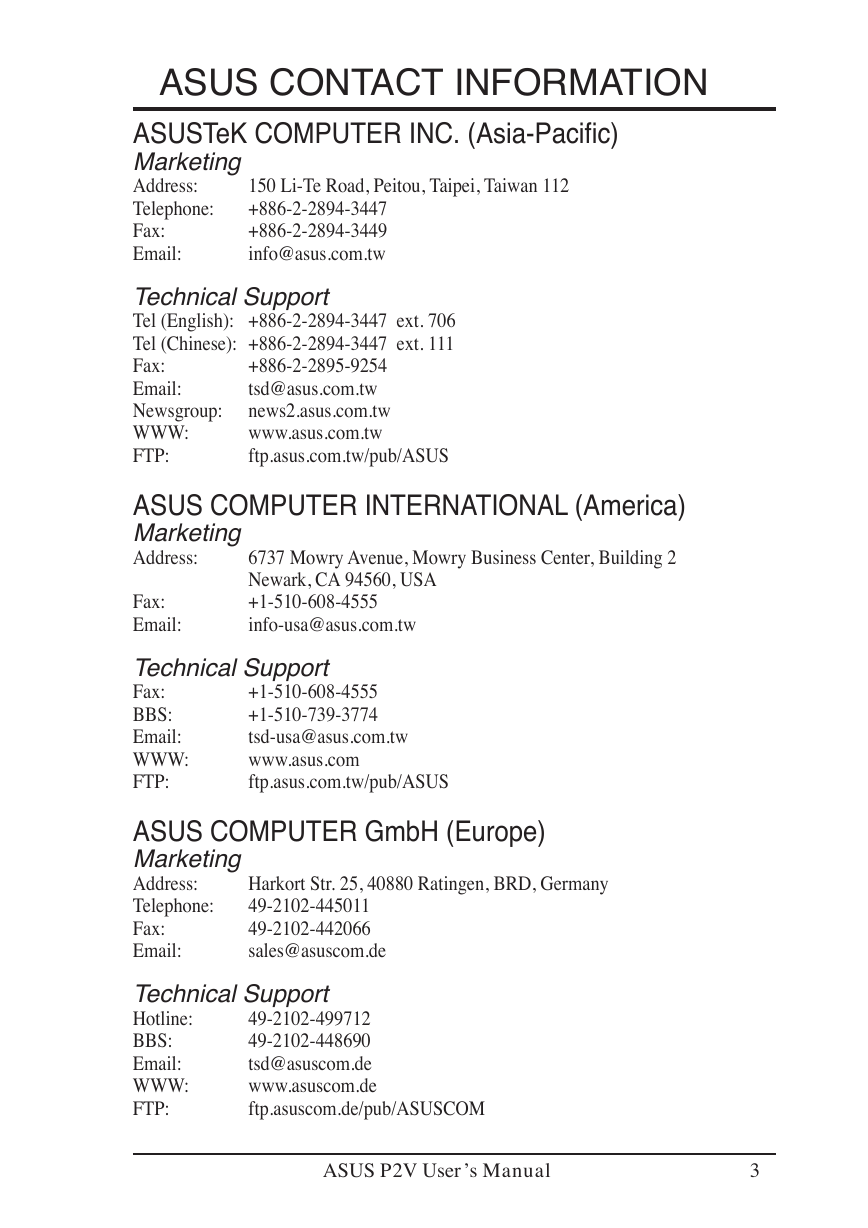
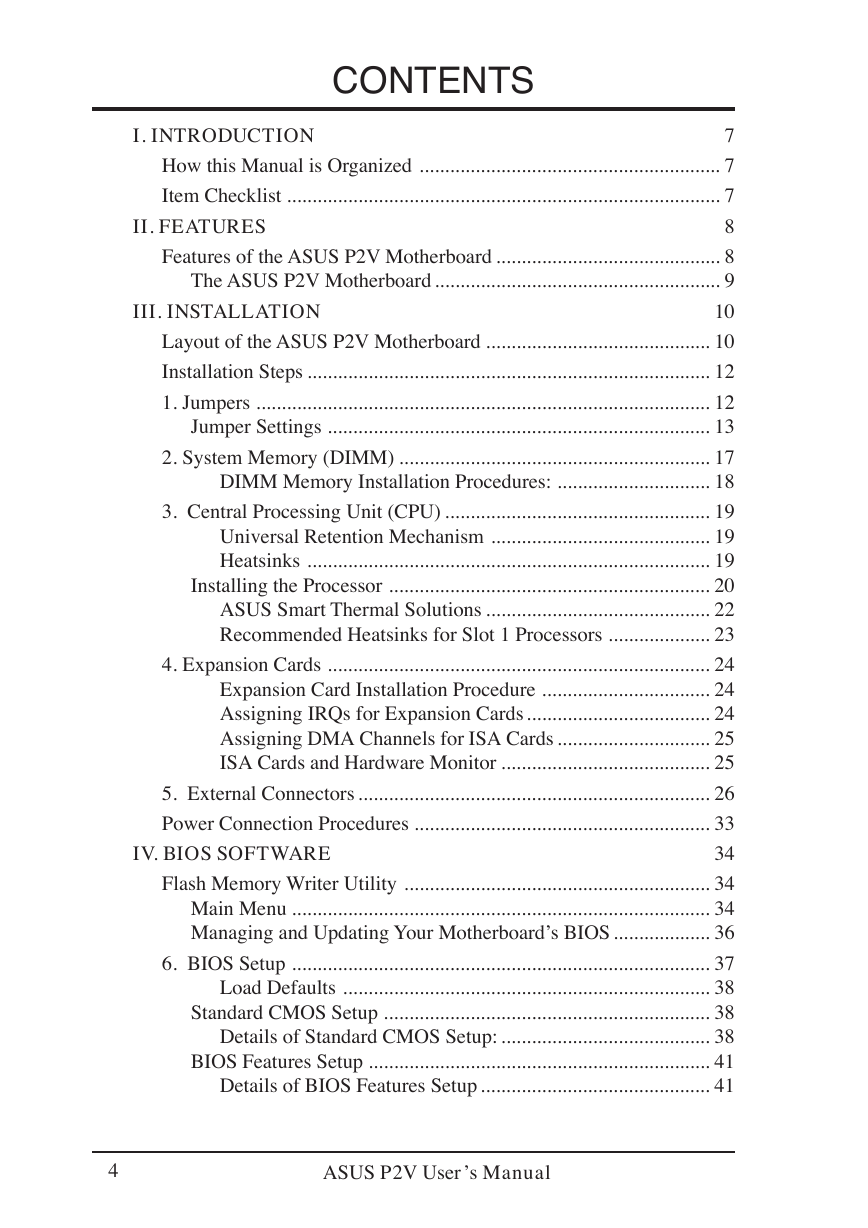
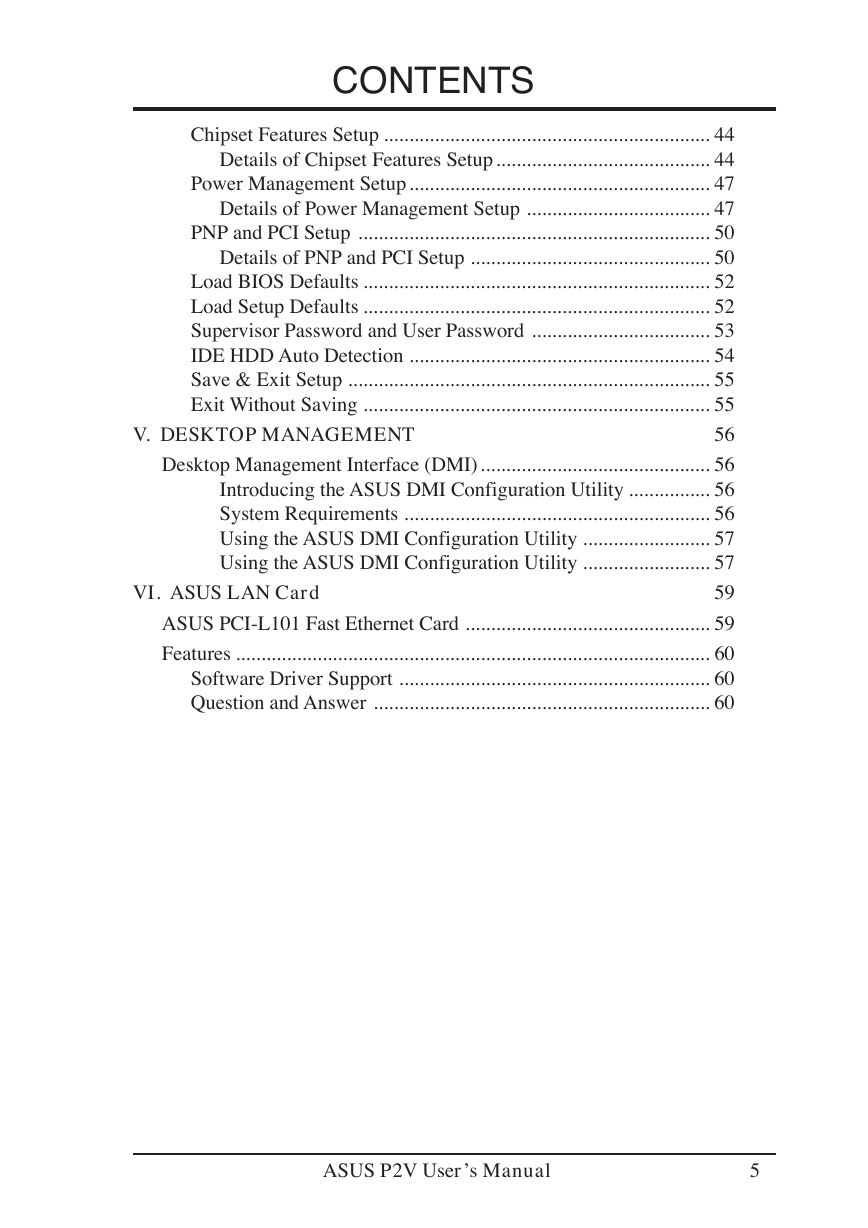
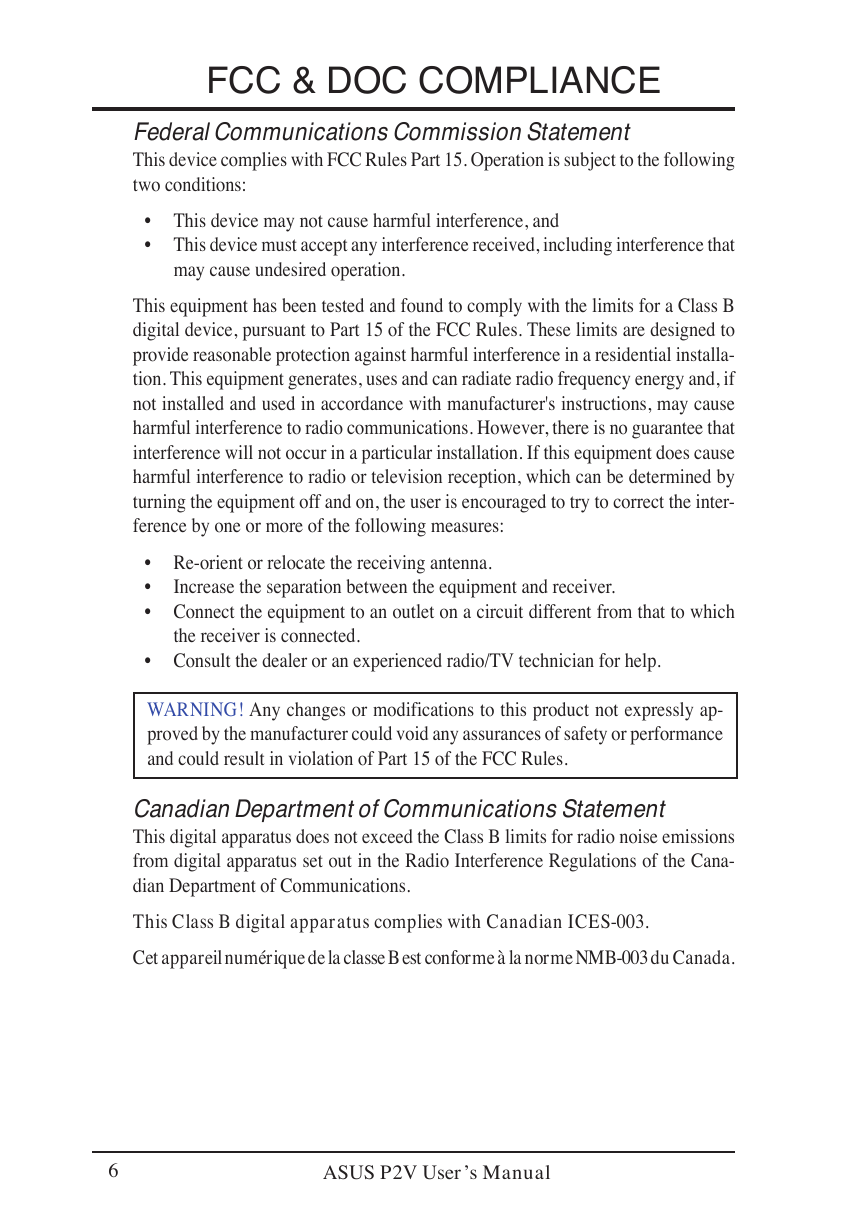
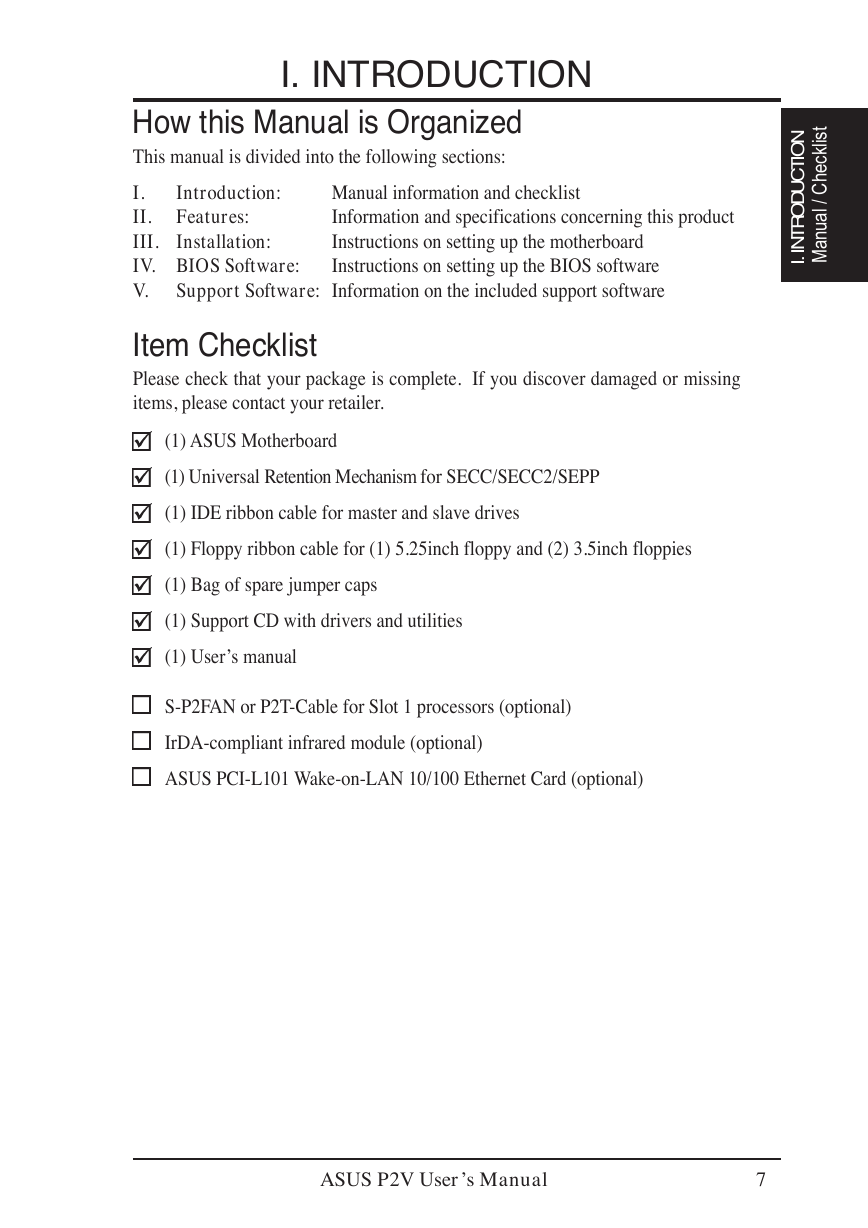
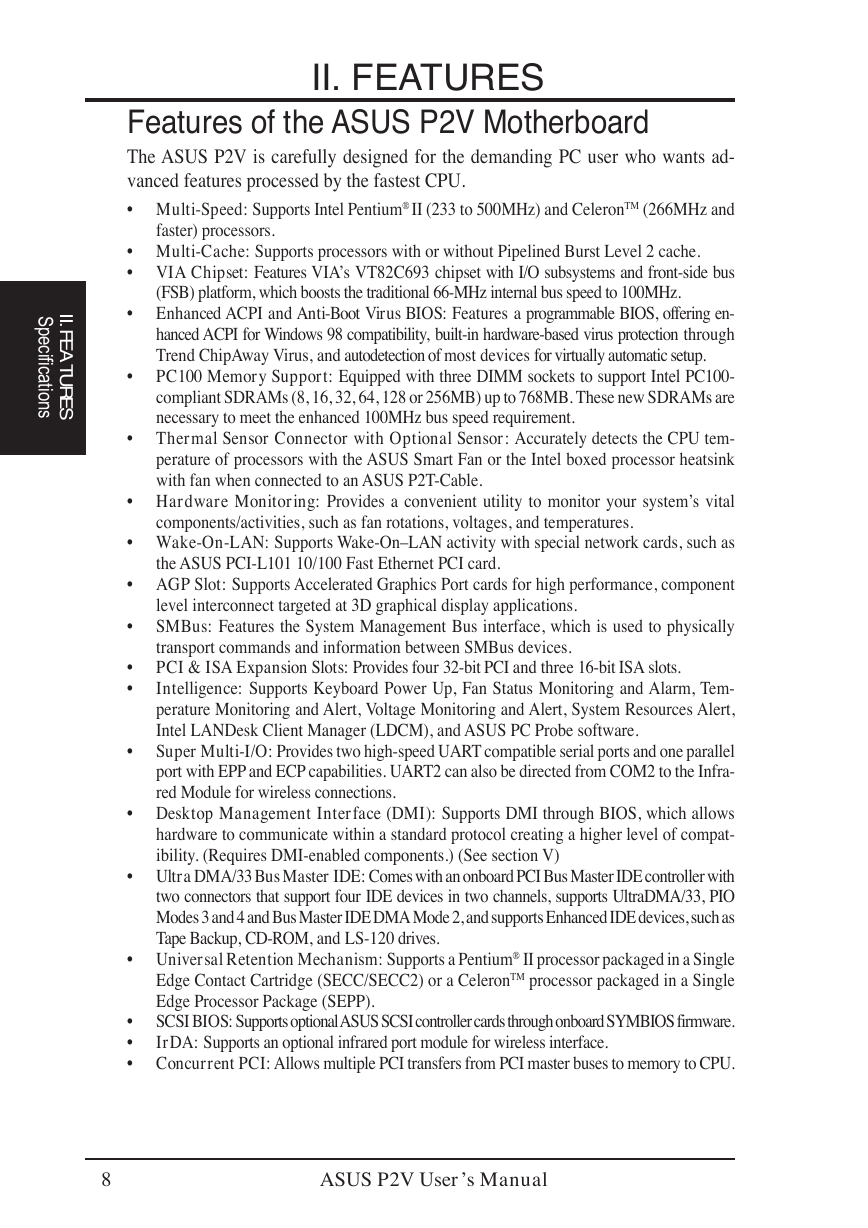








 2023年江西萍乡中考道德与法治真题及答案.doc
2023年江西萍乡中考道德与法治真题及答案.doc 2012年重庆南川中考生物真题及答案.doc
2012年重庆南川中考生物真题及答案.doc 2013年江西师范大学地理学综合及文艺理论基础考研真题.doc
2013年江西师范大学地理学综合及文艺理论基础考研真题.doc 2020年四川甘孜小升初语文真题及答案I卷.doc
2020年四川甘孜小升初语文真题及答案I卷.doc 2020年注册岩土工程师专业基础考试真题及答案.doc
2020年注册岩土工程师专业基础考试真题及答案.doc 2023-2024学年福建省厦门市九年级上学期数学月考试题及答案.doc
2023-2024学年福建省厦门市九年级上学期数学月考试题及答案.doc 2021-2022学年辽宁省沈阳市大东区九年级上学期语文期末试题及答案.doc
2021-2022学年辽宁省沈阳市大东区九年级上学期语文期末试题及答案.doc 2022-2023学年北京东城区初三第一学期物理期末试卷及答案.doc
2022-2023学年北京东城区初三第一学期物理期末试卷及答案.doc 2018上半年江西教师资格初中地理学科知识与教学能力真题及答案.doc
2018上半年江西教师资格初中地理学科知识与教学能力真题及答案.doc 2012年河北国家公务员申论考试真题及答案-省级.doc
2012年河北国家公务员申论考试真题及答案-省级.doc 2020-2021学年江苏省扬州市江都区邵樊片九年级上学期数学第一次质量检测试题及答案.doc
2020-2021学年江苏省扬州市江都区邵樊片九年级上学期数学第一次质量检测试题及答案.doc 2022下半年黑龙江教师资格证中学综合素质真题及答案.doc
2022下半年黑龙江教师资格证中学综合素质真题及答案.doc